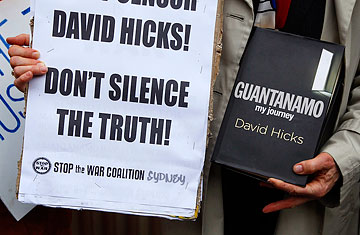
A supporter of former Guantánamo Bay inmate David Hicks holds a copy of his memoir during a protest outside the New South Wales Supreme Court in Sydney on Aug. 3, 2011
In December 2007, a media-shy David Hicks walked out of Adelaide's Yatala prison after serving a nine-month sentence for providing material support for terrorism. The scene was the finale in a six-year ordeal, more than five years of which Hicks, internationally known as the Aussie Taliban, had spent in Guantánamo Bay for his involvement with al-Qaeda and Pakistan-based militant group Lashkar-e-Taiba.
During that time, Hicks became a mascot for Australia's growing antiwar movement. He was held for two years without charge in the American detention center in Cuba before becoming the first detainee to be convicted under the U.S. Military Commissions Act of conspiracy to commit war crimes, attempted murder and aiding the enemy. Those charges were later dropped when the military commission set up for prisoners like Hicks was deemed illegal by the U.S. Supreme Court.
Sydney-based advocacy group GetUp!, in one of several campaigns to get Hicks home, raised enough donations to fund billboards, television advertisements, surveys and protests over the young man's imprisonment. Their petition, which urged the Australian government to call for Hicks' release from Guantánamo and have him tried in Australia, collected 50,000 signatures. Eventually, Hicks was found guilty for providing material support for terrorism. He was handed a seven-year sentence, of which all but nine months were suspended. The sentence was served in Australia. Even those who didn't support Hicks' return to Australia couldn't help but be interested the story of the kangaroo skinner turned jihadist turned Guantánamo Bay prisoner. When did the young Muslim convert, who in 1999 flew from Adelaide to Pakistan where he made contact with Lashkar-e-Taiba, take a wrong turn in life? Did he always have terrorist aspirations? These questions remained unanswered for some time; one of the court's conditions of Hicks' release in 2007 was a one-year gag order. When he was freed, his father Terry Hicks told TIME that his son had no plans to write a memoir: "I keep saying he may change his mind, but he's said no."
Eventually, however, Hicks had a change of heart. In October 2010, Guantanamo: My Journey was published by Random House Australia. Sales were modest at roughly 30,000 copies, and reviews ranged from lukewarm to scathing. Sally Neighbour, an Australian journalist and expert in militant Islam, described the memoir as an "airbrushed version of the truth" that glossed over damning details like the four al-Qaeda military-training courses that Hicks attended before his arrest by the Northern Alliance in Afghanistan in late 2001. Other critics also felt that the picture Hicks, now 36, painted of himself was incomplete and that he provided inconsistent details regarding the circumstances that led to his arrest. Hicks, who currently lives in Sydney, responded by telling the Sydney Morning Herald that he had never heard of al-Qaeda until he had reached Guantánamo.
Now Hicks finds himself entangled in another kind of legal battle. In March 2007, when he was still being held at Guantánamo, Hicks pleaded guilty before the military commission to providing material support for terrorism. His supporters say the plea was made under duress. Nevertheless, under the Australian Proceeds of Crime Act, which forbids criminals from profiting from their crimes, making money from Guantanamo: My Journey could be illegal.
On Aug. 3, the New South Wales Supreme Court froze assets associated with the profits Hicks made from the sale of the memoir after prosecutors decided to press charges. Court has been adjourned to Aug. 16, but in the meantime the national debate that surrounded Hicks' case nearly 10 years ago has resumed.
David Shoebridge, a New South Wales MP from the Greens party, told the Sydney Morning Herald that the trial is politically motivated. "What the Australian government is trying to do is to send a message out not only to David Hicks, but to send a message to any future author, that if you want to publish a political story then you are going to be silenced by the Australian government." Why else, Shoebridge asks, would the government choose such a high-profile case to prosecute? He points out that Mark Brandon "Chopper" Read, a gangster who was portrayed by Eric Bana in the critically acclaimed film Chopper, has kept the profits from his semiautobiographical series of books on which the 2000 movie was based without any legal problems.
But Hicks' case is complicated. Technically, in Australia, Hicks might not be a convicted criminal. "He wasn't convicted in Australia, and he wasn't convicted in a court," says Peter Faris, a Melbourne-based criminal barrister. "His plea was taken in front of a military commission, which isn't the same as a court."
Even if the verdict of the military tribunal proves to be legally binding under Australian law, Hicks' defense team will argue that his conviction should be re-examined because his plea was made under duress. "If you call torture holding people in solitary confinement, what I would call unlawful imprisonment for five years — I think that's duress," Stephen Kenny, Hicks' former lawyer, told the Australian Broadcasting Corporation on Aug. 3. "David was keen to get out of there. He had to get out of there."
Whatever happens, the trial is already bigger than the infraction it involves. The costs of the proceedings have already exceeded the $10,000 that Hicks has collected from his book. Faris says that even if Hicks wins and his court fees are reimbursed, the money will likely be "eaten up" by his legal expenses. "It's no longer about money. It's become an arm wrestle of principle instead."
